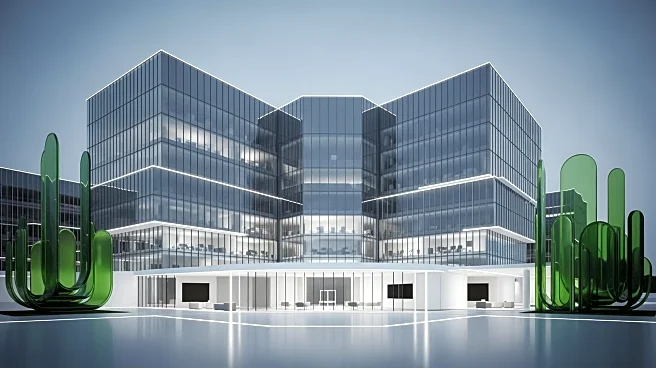What's Happening?
Ford Motor Co. has unveiled its new headquarters in Dearborn, Michigan, marking the first central office relocation since the Eisenhower administration. The new facility, named 'Ford World Headquarters,' is double the size of the previous building and
includes a 'crown jewel' showroom, described as akin to a 'James Bond villain's lair.' The headquarters features a 160,000-square-foot food hall, office spaces, design studios, and fabrication shops, accommodating up to 4,000 employees. The move is part of Ford's strategy to modernize its image and attract talent in software engineering and artificial intelligence, reflecting its ambition to be seen as a forward-looking company.
Why It's Important?
The relocation of Ford's headquarters signifies a strategic shift towards modernizing its corporate image and operations. By creating a workspace that fosters collaboration and innovation, Ford aims to attract top talent in technology and engineering, essential for its future in automotive design and production. This move is crucial as Ford competes with other companies for skilled professionals in AI and software development, areas increasingly vital to the automotive industry. The new headquarters also symbolizes Ford's commitment to evolving beyond traditional car manufacturing, positioning itself as a leader in technological advancements within the sector.
What's Next?
Ford plans to complete the transition to its new headquarters by 2027, with a grand opening celebration scheduled. The company is focusing on integrating more than 14,000 employees within close proximity to the new facility, enhancing collaboration and efficiency. As Ford continues to develop its new headquarters, it will likely focus on expanding its technological capabilities and fostering a culture of innovation. This move may prompt other automotive companies to reevaluate their own headquarters and operational strategies to remain competitive in attracting top-tier talent.
Beyond the Headlines
Ford's headquarters relocation reflects broader trends in the automotive industry, where companies are increasingly prioritizing technological innovation and modern work environments. This shift may influence corporate culture, emphasizing flexibility, collaboration, and cutting-edge design. The move also highlights the growing importance of sustainability and efficiency in corporate operations, as companies seek to reduce their environmental footprint and enhance employee well-being.















